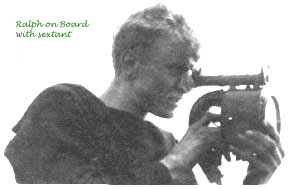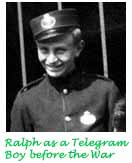

|
|||||
| Ralph Stobart Robson, signalman, life in the British Royal Navy World War Two, sinking of Prince of Wales and the Repulse, Singapore | |||||
|
|||||
|
|||||
|
The sun or honey-bear was a different proposition. Although small and friendly looking, these bears could give you a nasty wound, so we knocked off the lock, propped open the door and went for our dinner. After dinner I went back and was just in time to spot a little plunge down the shore as the bear entered the strait. I watched as he gamely struggled across. Finally he reached the other side, a cheering sight in a series of dismal days. Below the swimming pool were the playing fields. There were football and cricket pitches, the whole green sward running down to the water's edge. A huge oil pipe ran across the green near the sea. It came from a compound of oil tanks which lay to the western side of the barracks and carried fuel to the naval dockyard. Across the strait was the far jungle-covered shore running down towards the sea. To the right, stretching towards the dockyard was the officers' housing. The survivors fell in before the Regulating Office every morning, waiting to be told what to do. In truth there was such a huge number of men that there was nothing for them to do but await a draft. Pretty soon the numbers dwindled as men were drafted to ships of all kinds. Civilian ships were crewed as a desperate search began for vessels to use against the enemy. Many seamen and marine rates of boys were returned to the United Kingdom during this time. Among them were two good friends of mine, Signal Boys Henry Heron and 'Tich' Backhouse. Happily I did see them both again when they got held up in Colombo through lack of homeward-bound ships. I never saw either of them again after that, although Henry kindly visited my mother a few times on Tyneside. During this time of waiting I began to wonder whether I had done the right thing in recording myself as a Repulse survivor. Doubts began to arise. Had I still been listed as part of the crew of the Prince of Wales? Had my documents, things which sailors rarely thought about, recorded my transfer to the Repulse? A terrible thought crossed my mind. If I had been recorded as still part of the crew of the Prince of Wales, my mother might have been informed that I was missing. Off I went to the Jaunty's Office where one of the petty officers listened to my story and then advised me to go to the Pay and Records Office. Here one of the men behind the counter heard my tale and then went away. He came back with a Pay Bob, or Pay Officer. The officer said that it would take some time to sort things out. He advised me to return to my barrack block until sent for. Some time later a rating appeared and said I had to report back to the Pay Office. When I got there the Pay Officer asked me to sit down. This invitation, unprecedented in my experience, astounded me. He then said, "You have been reported as missing from the Prince of Wales, but don't worry. A signal has been sent to the Admiralty to say that you are alive and well. They will pass the good news to your mother." For the first time in my naval career I had met an officer who had behaved like the proverbial gentleman. He held out his hand and wished me good luck. Almost from the moment of the survivors' return to Singapore the island had been under air bombardment. The orderly, imperial city we had found on our original visit had been transformed into a bewildering, uncertain place. Flights of bombers daily made their way towards the city, which lay on the southern and western side of the island. The navy base lay towards the north-east and we often saw parties of twenty-seven bombers flying high above us. Usually the planes split up into groups of nine before swooping towards their target. There were sporadic attacks on a nearby airfield, then one morning the oil tanks were hit. The oil tanks were tall cylinders each contained in a bund about ten or twelve feet high, consisting of earth mounds lined with concrete and brick. These bunds were to contain any oil spillage. Fortunately the larger bunds never seemed to leak. Several tanks were ruptured and set on fire. The air was filled with huge columns of oily black smoke which towered over the island, including the barracks. When the wind was in the right, or more accurately for us, the wrong direction, the air at the barracks was filled with black smuts. Luckily this did not happen very often. As the tanks burned there was a loud roaring noise, very menacing and highly unpleasant. The bombing continued with ever-increasing ferocity. The barracks were hit several times. There was general damage but I remember in particular that the galley was hit, killing the Chinese cooks. The dining hall too was damaged. The galley staff who were not too badly hurt promptly voted with their feet and took off. It took some time for white cooks to be organised as their replacements. Vice Admiral Sir Geoffrey Layton had been made Commander in Chief of the Far Eastern Fleet and was therefore in charge of all the remaining naval personnel. One day he had the unpleasant task of telling the men who were assesmbled on the parade ground, mostly survivors, that they were not to be sent home but were to be retained for local duties. The news was not well received. This was in no small part due to the utterly insensitive wording and arrogant delivery. We were told that we were not to be sent home to sit on our backsides while other men carried out "unfinished" jobs. This seemed to us to imply that we were responsible for the sinking fiasco. One old stoker behind me began muttering unprintable oaths, something that was previously unheard of. There were numerous mutterings from the ranks while the speech continued. Judging by the vice admiral's furious expression he could plainly hear them. Sir Geoffrey addressed us from the first floor balcony of the barrack block. He hadn't been speaking long when the muttered grumbling noise increased. This time it wasn't the matelots. Sneaking peeps over our shoulders, we confirmed that a large group of aircraft were approaching. We assumed that they were heading for Singapore and were not unduly alarmed until a group of nine planes left the main force and made their way towards us. It was obvious that the pilots had spotted the large group of assembled men and were not going to miss what was for them a golden opportunity. The planes were approaching from the right, to the rear of the assembled men. Sir Geoffrey, who faced them from the balcony, urged us to stand fast and show the Japs what the British were made of. The first man to indicate his contempt for this advice was the stoker, who uttered a loud oath and declared that he was leaving the ******* parade ground that very instant. Immediately the parade took on the aspect of spilled quicksilver as the men ran for the shelters. A few of us hared down to the football ground and into the mangrove swamp alongside the oil pipeline which was now empty. As we struggled along we had a clear view of the bombers. We saw the flashes and spouts of flame and smoke as they scored direct hits. This was the only occasion that I have heard of when there was a virtual mutiny in the navy. As the bombers disappeared we slowly returned to the barracks. Everyone thought that we were in dire trouble but surprisingly not a word was said. In the centre of the parade ground was the justification for our action, two medium sized bomb craters. These had been caused by anti-personnel bombs, bombs which exploded and threw out a huge spread of fragmented steel pieces. These would have cut through the men on the parade ground like a scythe. If we had stayed behind there would have been a horrendous tragedy. Sir Geoffrey had disappeared and that was the only time I saw him. Shortly afterwards he demonstrated his determination to 'stand fast' by prudently posting himself to Ceylon, where he doubtless continued to show what the British were made of. |
|||||
|
|||||
